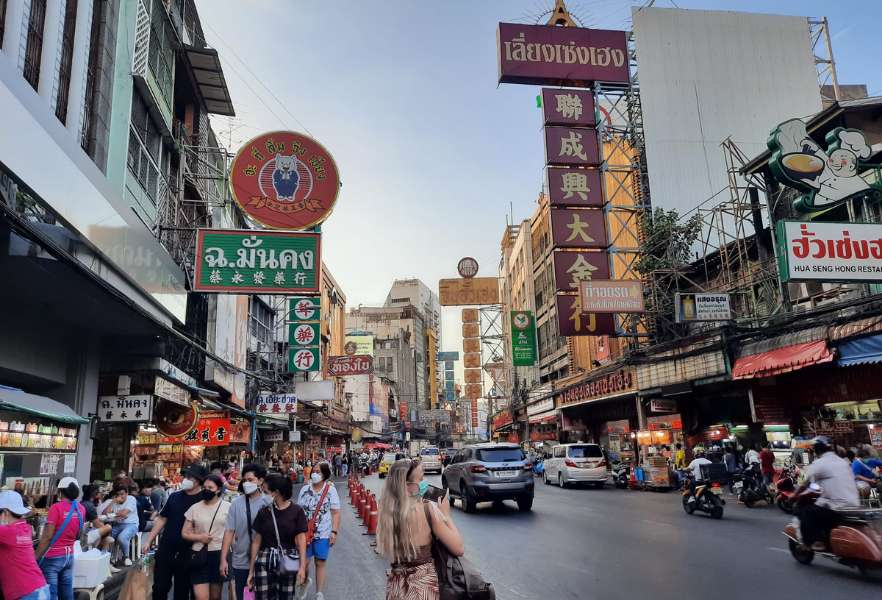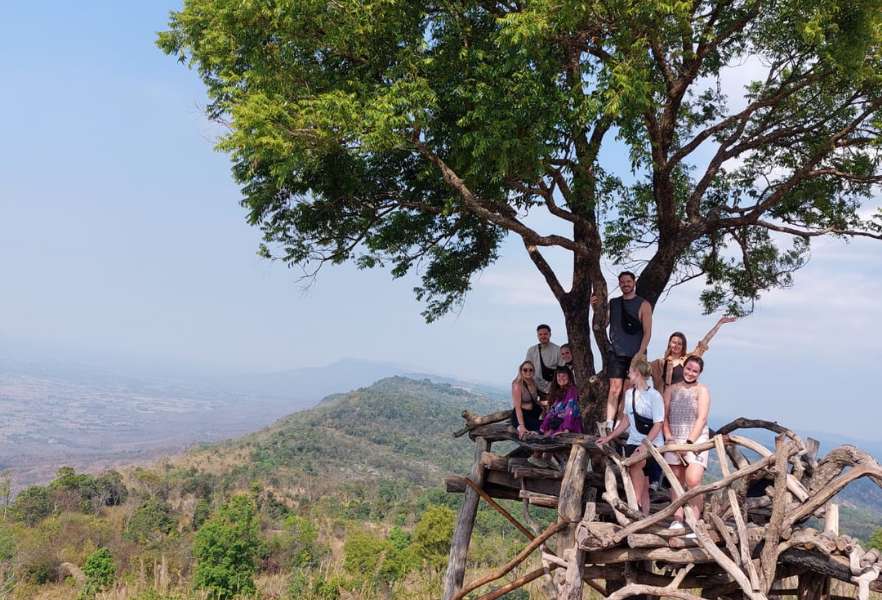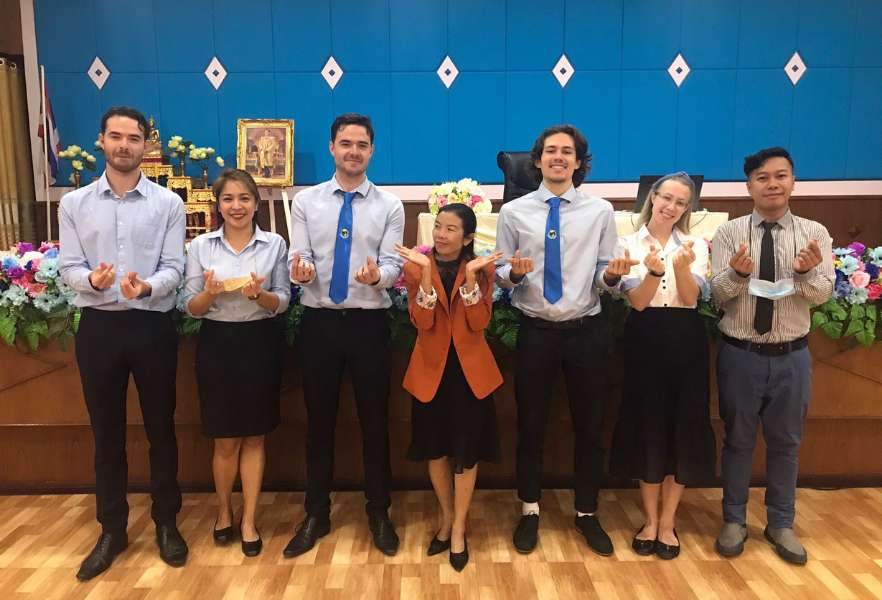When leafing through the lonely planet guide or scrolling through booking.com, we rarely consider rural Thailand as a destination for TEFL. These outlying regions are often overshadowed by the azure ocean to the south or the buzzing northern metropolis.
Whilst applying to TEFL in Thailand, you’ll notice that most jobs advertised are at one of 2 extreme ends of the scale (in terms of location). They are either in bustling Bangkok or rural, off-the-beaten-track towns and villages. This makes for a difficult decision. So, if you’re torn between the rustic beauty of Thailand’s countryside and the dizzying heights of Bangkok’s sky bars: look no further than this guide!
I’m going to take you through what it’s like living in rural Thailand vs living in a big city, like Bangkok.
City Life – Thailand’s Thrilling Metropolis
While Bangkok may have a new tongue-twister name (try saying “Krung Thep Maha Nakhon after a few chang beers!) its status as the tourist capital of the world remains the same. No matter the time of year, Thailand’s capital is packed full of tourists, Thai nationals, and ex-pats alike. With its Michelin star street food, glimmering palaces, and skyscraper bars above plastic stall beers, it’s easy to see why. There’s something for everyone!
Many TEFLers choose to live and work in the metropolis for a variety of reasons. Of these, one important factor is the higher pay offered to English teachers here. On average, those working in Bangkok can receive up to 1,800 USD per month, with some private English academies offering paid vacation and health insurance as well. While you’ll still have to pay rent, the cheap cost of living means you’ll be able to save plenty of money each month- perfect for funding future travels!
Choosing Bangkok through a paid internship like i-to-i’s will mean you get your TEFL course included, so much in-country support, and they will help you find cheap, safe, and comfortable accommodation, so you don’t need to trek round trying to find your own! And, don’t worry, with the salary provided you’ll still be able to comfortably experience all that city life has to offer and put some money aside too.
The capital is also unique in that it offers plenty of Thai culture to experience, as well as providing the comforts of western life. Expats in Bangkok can choose an 80p pad thai for their main course, and an English-style cream tea for dessert mere streets away. In such a sprawling city (50 districts to be exact!) there truly is a food to suit every taste palette, a boutique to suit every fashion style, and an outlet for every hobby. Additionally, the Thai locals who you meet at these places will likely have a good command of English. The westernised nature of Bangkok means levels of English are high, making it easier to communicate and lessening the possibility of experiencing culture shock.
Rural Life – Getting an Authentic Experience
However, Bangkok’s status as a tourist hotspot has led to a surge of western influence. This, arguably, has come at the cost of authenticity. Those TEFLing in the capital will find pockets of pre-tourism Thai culture, but much of central Bangkok has a distinctly commercial feel.
By contrast, opting for a teaching placement in rural Thailand will be a completely authentic experience, owing to the untouched nature of these regions. One example is Isaan, which is where I’ve been teaching since October 2021.
This expansive, beautiful region stretches from the Cambodian border in the southeast, to the Laos border in Thailand’s northern corner. The proximity to bordering nations provides a three-in-one cultural experience, which makes living here all the more interesting. For example, the language and lifestyle of northern Chaiyaphum province is a unique fusion of Laotian and Thai language and culture that cannot be found elsewhere. So, I’m getting a really unique experience!
Though firmly off the tourism radar, Isaan is a region where ex-pats can choose between unspoilt nature and bustling Thai communities- all while enjoying a much lower cost of living.
TEFL teachers in such rural areas will also have the chance to learn more Thai than those in urban areas, as city economies often rely on the English-speaking tourism trade. Here in Isaan, my fellow teachers and I have learnt basic Thai to boost our communication with the locals. However, what started as a tool used to get by quickly grew into a genuine love for the Thai language. Locals in these rural communities are ecstatic if an ex-pat greets them in their language, which makes for a more organic TEFL experience.
How you’ll be received as a foreigner in each location
One of the starkest differences between living in rural Thailand vs Bangkok: how you’ll be received as an ex-pat.
Every year, around 22,000,000 foreign tourists arrive in Bangkok- contributing briefly to the city’s cultural melting pot. It’s, therefore, no surprise that the local population has grown indifferent to tourists and foreign ex-pats alike. This makes it easy to blend into the background- which might be good for TEFL teachers that prefer to stay out of the spotlight.
In the rural communities of Isaan, however, foreigners, or “farangs” as we’re affectionately known, are much more of a novelty. Simply because not many tourists visit these areas, your students, colleagues, and neighbours will be very inquisitive. Thankfully, rather than being invasive, this curiosity will leave you feeling more valued as a member of the community. Thailand is, after all, named the “Land of Smiles” for a reason, and this will be evident whenever you interact with a member of your adopted community. They love us being there!
On the other hand, receiving so much attention can be overwhelming, especially in your first few weeks trying to navigate life as a TEFL teacher in Thailand. The bright side? Culture shock is temporary. Remember, anything that pushes you out of your comfort zone will enhance your personal development in the long run.
Differing Social Lives
After leaving the classroom, having a buzzing social life is on top of every TEFL teacher’s list of priorities. As you’d expect, socializing in a busy metropolis is very different from the slower pace of life in rural Thailand. There are pros and cons to each – one isn’t necessarily better than the other.
With its thousands of ex-pats scattered throughout the city, you’re sure not to feel lonely in Bangkok. Advertised in its many Facebook communities, foreigners in the capital are always creating social events: from book clubs to pub quizzes. And you might not even have to go that far to meet people, as there will likely be English teachers at your school starting at the same time. You are, however, less likely to meet and socialise with local people, as you’ll get comfortable in your ex-pat bubble.
With fewer facilities and fewer jobs to entice a multitude of ex-pats, rural Thailand can seem isolated on the surface. However, living in a smaller community creates a distinctly village-esque feel. This means you’re more likely to build meaningful relationships with the locals and the other teachers at your school. And making Thai friends is a sure-fire way to enrich your experience as an ex-pat. You’ll be able to learn more about Thai culture, try your hand at the language, and gain a rare insight into local attractions and natural wonders. In addition, you’ll be placed with fellow TEFL teachers– meaning there’s always someone to experience rural Thailand with, in all its authenticity.
While this article compares two of the main placement options for future TEFL teachers in Thailand, there are a wealth of options in-between to explore! Whether you’re up for venturing off the beaten path or would prefer to call the vibrant urban centre your home, I can promise you’ll have an amazing time regardless!
Want a supported way of travelling to Thailand to test out your teaching skills? Check out our Thailand Internships! Want to find out more about Thailand? Download your FREE Thailand guide. And, if you have any questions, you can arrange a free call back with one of our TEFL experts – they’ll be happy to help.
Would you prefer to go it alone and find a job yourself? No problem! Check out the latest TEFL vacancies in Thailand on the LoveTEFL jobs board. And, don’t forget, our amazing Jobs Team are on hand if you need any assistance perfecting your application!
Need to get TEFL qualified before you start job hunting? Then take our 2 minute course matching quiz to find your perfect fit before you book!








